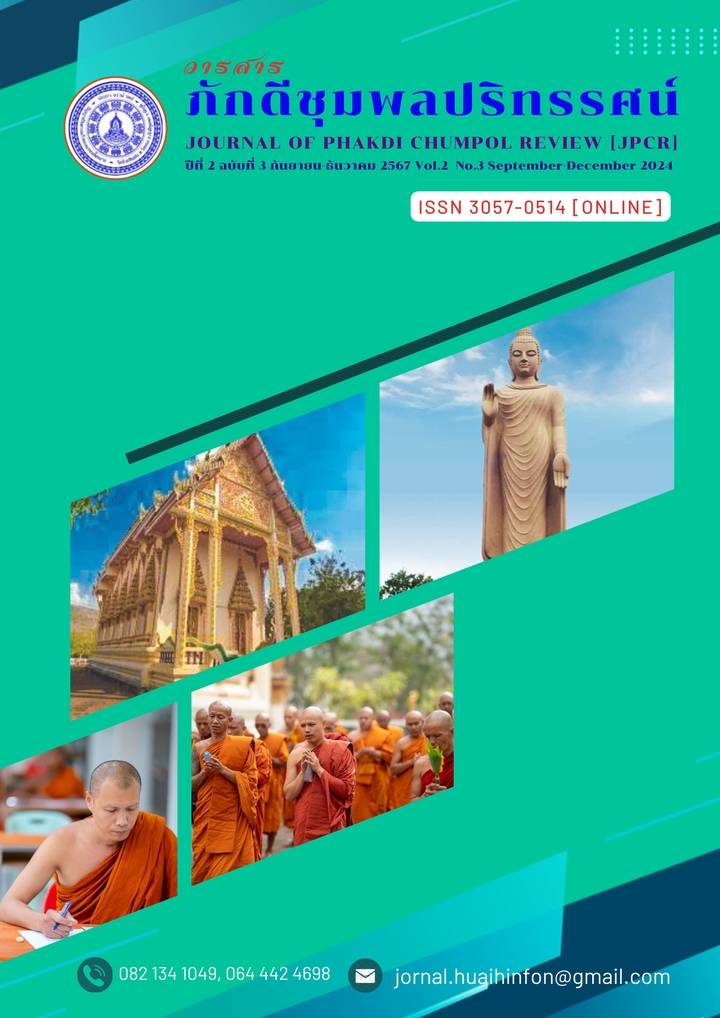Characteristics of Local rulers that are desirable According to the principles of Sappurisadhamma
Keywords:
Characteristics, Local rulers, According to the principles of SappurisadhamAbstract
This article aims to study the characteristics of local parents that are desirable according to the principles. Sappurisadham found that: The village headman and village headman are considered part of the political and administrative institution. Which has been born and has developed continuously since the reign of King Chulalongkorn, King Rama V, with village headman and village headman having roles and authority in sub-districts and villages. The village headman and village headman has the status of a representative of the state who works closely with the local people to help with coordination. Resident meeting notifying government news to residents and taking care of the happiness and suffering of the residents in various aspects. Therefore, the village headman and village headman are closest to the people. Accurately know the needs of the people in the area that the people in that area what do you want? And respond to the needs of the people in the area correctly and appropriately
There are 4 characteristics of a local ruler that are desirable according to the principles of Sappurisadhamma: 1) Characteristics according to the principles of Sappurisadhamma Local parents should have knowledge and ability. Morality and ethics and maturity in governance. 2) Behavior according to the principles of Sappurisadhamma Local rulers should like to help, use polite words, and be decisive in their governance. 3) According to the situation according to principles Sappurisadham Local parents should have courage, courage in making decisions, and being able to adapt well to the times. And 4) Change according to the principles of Sappurisadhamma Local parents should dare to change and develop the community for prosperity. And being an inspirational leader.
References
มหาจุฬาลงกรณราชวิทยาลัย. (2539). พระไตรปิฎกภาษาไทย ฉบับมหาจุฬาลงกรณราชวิทยาลัย. กรุงเทพมหานคร : โรงพิมพ์มหาจุฬาลงกรณราชวิทยาลัย.
เจริญทิพย์ อร่ามรุ่งโรจน์. (2560). “คุณลักษณะที่พึงประสงค์ของผู้ใหญ่บ้านในศตวรรษที่ 21 ในทัศนะของประชาชนอำเภอลี้ จังหวัดลำพูน”. วิทยานิพนธ์รัฐประศาสนศาสตรมหาบัณฑิต สาขาวิชารัฐประศาสนศาสตร์. บัณฑิตวิทยาลัย : มหาวิทยาลัยเชียงใหม่.
ณรงค์ สินสวัสดิ์. (2521). สังคมกับการปกครอง. กรุงเทพมหานคร : สำนักพิมพ์แพร่วิทยา.
ราตรี แสงจิต. (2548). “คุณลักษณะผู้ใหญ่บ้านในความคาดหวังของประชาชน : ศึกษากรณีชุมชนในเขตตำบลบ้านปึก อำเภอเมือง จังหวัดชลบุรี”. วิทยานิพนธ์รัฐประศาสนศาสตรมหาบัณฑิต สาขาวิชารัฐประศาสนศาสตร์. บัณฑิตวิทยาลัย : มหาวิทยาลัยบูรพา.
สุเทพ พงศ์ศรีวัฒน์. (2544). ภาวะผู้นำทฤษฎีและปฏิบัติ ศาสตร์และศิลป์สู่ความเป็นผู้นำที่สมบูรณ์. กรุงเทพมหานคร : สำนักพิมพ์วิรัตน์ เอ็คดูเคชั่น.
ส่วนบริหารงานกำนันผู้ใหญ่บ้าน สำนักบริหารการปกครองท้องที่. (2564). คู่มือปฏิบัติงานกำนัน ผู้ใหญ่บ้าน ฯลฯ. กรุงเทพมหานคร : กรมการปกครอง กระทรวงมหาดไทย.
Robbins S.P. (1996). Organization behavior: Controversies and application. New Jersey: Prentice-Hall.
McGregor Douglas. (1969). The Human Side of Enterprise. Now York: McGraw-Hill Book Company.




